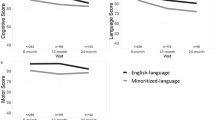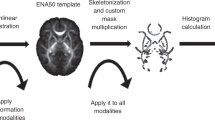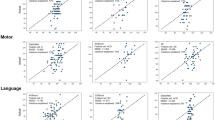Abstract
Prenatal maternal stress has been shown to impair functioning in nonhuman primate offspring. Little is known about the effects of prenatal stress on intellectual and language development in humans because it is difficult to identify sufficiently large samples of pregnant women who have been exposed to an independent stressor. We took advantage of a natural disaster (January 1998 ice storm in Québec, Canada) to determine the effect of the objective severity of pregnant women's stress exposure on general intellectual and language development of their children. Bayley Mental Development Index (MDI) scores and parent-reported language abilities of 58 toddlers of mothers who were exposed to varying levels of prenatal stress were obtained at 2 y of age. The hierarchical multiple regression analyses indicated that the toddlers' birth weight and age at testing accounted for 12.0% and 14.8% of the variance in the Bayley MDI scores and in productive language abilities, respectively. More importantly, the level of prenatal stress exposure accounted for an additional 11.4% and 12.1% of the variance in the toddlers' Bayley MDI and productive language abilities and uniquely accounted for 17.3% of the variance of their receptive language abilities. The more severe the level of prenatal stress exposure, the poorer the toddlers' abilities. The level of prenatal stress exposure accounted for a significant proportion of the variance in the three dependent variables above and beyond that already accounted for by non–ice storm–related factors. We suspect that high levels of prenatal stress exposure, particularly early in the pregnancy, may negatively affect the brain development of the fetus, reflected in the lower general intellectual and language abilities in the toddlers.
Similar content being viewed by others
Log in or create a free account to read this content
Gain free access to this article, as well as selected content from this journal and more on nature.com
or
Abbreviations
- PNMS:
-
prenatal maternal stress
- MDI:
-
Mental Developmental Index
- MCDI:
-
MacArthur Communicative Development Inventory
References
Schneider ML, Cole CL 1993 Repeated social stress during pregnancy impairs neuromotor development in the primate infant. J Dev Behav Pediatr 14: 81–87.
Schneider ML, Cole CL, Lubach GR 1992 Endocrine activation mimics the adverse effects of prenatal stress on the neuromotor development of the infant primate. Dev Psychobiol 15: 427–439.
Schneider ML 1992 Delayed object permanence development in prenatally stressed rhesus monkey infants Macaca mulatta. Occup Ther J Res 12: 96–110.
Crandon AJ 1979 Maternal anxiety and obstetric complications. J Psychosom Res 23: 109–111.
Lou HC, Hansen D, Nordentoft M, Pryds O, Jensen F, Nim J, Hemmingsen R 1994 Prenatal stressors of human life affect fetal brain development. Dev Med Child Neurol 36: 826–832.
Wadhwa PD, Sandman CA, Porto M, Dunkel-Schetter C, Garite TJ 1993 The association between prenatal stress and infant birth weight and gestational age at birth: a prospective investigation. Am J Obstet Gynecol 169: 858–865.
Van den Bergh BR 1990 The influence of maternal emotions during pregnancy on fetal and neonatal behavior. Pre Perinat Psychol 5: 119–130.
Goldman SL, Owen MT 1994 The impact of parental trait anxiety on the utilization of health care services in infancy: a prospective study. J Pediatr Psychol 19: 369–381.
O'Connor TG, Heron J, Golding J, Beveridge M, Glover V 2002 Maternal antenatal anxiety and childrens behavioural/emotional problems at 4 years. Report from the Avon Longitudinal Study of Parents and Children. Br J Psychiatry 180: 502–508.
Watson JB, Mednick SA, Wang X 1997 Cognitive Functioning in Offspring Following Severe Prenatal Stress. Society for Research in Psychopathology, Palm Springs, CA
Meijer A 1985 Child psychiatric sequelae of maternal war stress. Acta Psychiatr Scand 72: 505–511.
Scott DH 1973 Follow-up study from birth of the effects of prenatal stresses. Dev Med Child Neurol 15: 770–787.
Brouwers EPM, van Baar EL, Pop VJM 2001 Maternal anxiety during pregnancy and subsequent infant development. Infant Behav Dev 24: 95–106.
Kammerer M, Adams D, Castelberg Bv B, Glovert V 2002 Pregnant women become insensitive to cold stress. BMC Pregnancy Childbirth 2: 8
Glynn LM, Wadhwa PD, Dunkel-Schetter C, Chicz-Demet A, Sandman CA 2001 When stress happens matters: effects of earthquake timing on stress responsivity in pregnancy. Am J Obstet Gynecol 184: 637–642.
Norris FH 1990 Screening for traumatic stress: a scale for use in the general population. J Appl Soc Psychol 20: 1704–1718.
Rose SA 1981 Lags in the cognitive competence of prematurely born infants. In Friedman S, Sigman M (eds) Preterm Birth and Psychological Development. Academic Press, New York, 255–269.
Fried PA, O'Connell CM, Watkinson B 1992 60- and 72-month follow-up of children prenatally exposed to marijuana, cigarettes, and alcohol: cognitive and language assessment. J Dev Behav Pediatr 13: 383–391.
Jacobson SW, Jacobson JL 2000 Teratogenic insult and neurobehavioral function in infancy and childhood. In: Nelson CA (ed) The Minnesota Symposia on Child Psychology. Lawrence Erlbaum Associates, Mahwah, 61–112.
Sells CJ, Robinson NM, Brown Z, Knopp RH 1994 Long-term developmental follow-up of infants of diabetic mothers. J Pediatr 125:S9–S17.
Siegel LS 1982 Reproductive, perinatal, and environmental factors as predictors of the cognitive and language development of preterm and full-term infants. Child Dev 53: 963–973.
Siegel LS 1989 A reconceptualization of prediction from infant test scores. In: Bornstein MH, Krasnegor NA (eds) Stability and Continuity in Mental Development: Behavioral and Biological Perspectives. Lawrence Erlbaum Associates, Hillsdale, 87–103.
Humphreys LG, Davey TC 1988 Continuity in intellectual growth from 12 months to 9 years. Intelligence 12: 183–197.
King S, Barr RG, Brunet A, Saucier J-F, Meaney M, Woo S, Chanson C 2000 La tempête de verglas: une occasion d'étudier les effets du stress prénatal chez l'enfant et la mère. Santé mentale au Québec XXV: 163–184.
Hollingshead AB 1973 Four-Factor Index of Social Status. Yale University Press, New Haven
Bromet E, Dew MA 1995 Review of psychiatric epidemiologic research on disasters. Epidemiol Rev 17: 113–119.
McFarlane AC 1988 Relationship between psychiatric impairment and a natural disaster: the role of distress. Psychol Med 18: 129–139.
Weiss DS, Marmar CR 1997 The Impact of Event Scale–Revised. Guilford, New York
Jacobsen B, Kinney DK 1980 Perinatal complications in adopted and non-adopted samples of schizophrenics and controls. Acta Psychiatr Scand 62: 337–346.
Cox JL, Holden JM, Sagovsky R 1987 Detection of postnatal depression. Development of the 10-item Edinburgh Postnatal Depression Scale. Br J Psychiatry 150: 782–786.
Bayley N 1993 Bayley Scales of Infant Development, 2nd Ed. The Psychological Corporation, San Antonio
Fenson L, Dale PS, Reznick JS, Thal D, Bates E, Hartung JP, Pethick S, Reilly JS 1993 MacArthur Communicative Development Inventories. Singular Publishing Group, San Diego
Kimerling R, Calhoun KS, Forehand R, Armistead L, Morse E, Morse P, Clark R, Clark L 1999 Traumatic stress in HIV-infected women. AIDS Educ Prev 11: 321–330.
Asukai N, Kato H, Kawamura N, Kim Y, Yamamoto K, Kishimoto J, Miyake Y, Nishizono-Maher A 2002 Reliability and validity of the Japanese-language version of the Impact Of Event Scale-Revised (IES-R-J): four studies of different traumatic events. J Nerv Ment Dis 190: 175–182.
Siegel LS, Saigal S, Rosenbaum P, Morton RA, Young A, Berenbaum S, Stoskopf B 1982 Predictors of development in preterm and full-term infants: a model for detecting the at risk child. J Pediatr Psychol 7: 135–147.
Dollberg S, Marom R, Mimouni FB, Yeruchimovich M 2000 Normoblasts in large for gestational age infants. Arch Dis Child Fetal and Neonatal Ed 83:F148–F149.
Adams KM, Li H, Nelson RL, Ogburn PL, Danilenko-Dixon DR 1998 Sequelae of unrecognized gestational diabetes. Am J Obstet Gynecol 178: 1321–1332.
Raz S, Shah F, Sander CJ 1996 Differential effects of perinatal hypoxic risk on early developmental outcome: a twin study. Neuropsychology 10: 429–436.
Stevens CP, Raz S, Sander CJ 1999 Peripartum hypoxic risk and cognitive outcome: a study of term and preterm birth children at early school age. Neuropsychology 13: 598–608.
Seaver LH 2002 Adverse environmental exposures in pregnancy: teratology in adolescent medicine practice. Adolesc Med 13: 269–291.
Murray L, Cooper PJ 1997 Postpartum depression and child development. Psychol Med 27: 253–260.
Sameroff AJ, Seifer R, Barocas R, Zax M, Greenspan S 1987 Intelligence quotient scores of 4-year-old children: social-environmental risk factors. Pediatrics 79: 343–350.
Sameroff AJ, Seifer R, Zax M 1982 Early development of children at risk for emotional disorder. Monogr Soc Res Child Dev 47: 1–82.
Seifer R, Sameroff AJ, Dickstein S, Keitner G, Miller I, Rasmussen S, Hayden LC 1996 Parental psychopathology, multiple contextual risks, and one-year outcomes in children. J Clin Child Psychol 15: 423–435.
Avishai-Eliner S, Brunson KL, Sandman CA, Baram TZ 2002 Stressed-out, or in (utero)?. Trends Neurosci 25: 518–524.
Uno H, Tarara R, Else J, Sulemen MA, Sapolsky RM 1989 Hippocampal damage associated with prolonged and fatal stress in primates. J Neurosci 9: 1705–1711.
Uno H, Eisele S, Sakai A, Shelton S, Baker E, DeJesus O, Holden J 1994 Neurotoxicity of glucocorticoids in the primate brain. Horm Behav 28: 336–348.
Welberg LA, Seckl JR 2001 Prenatal stress, glucocorticoids and the programming of the brain. J Neuroendocrinol 13: 113–128.
Acknowledgements
We thank Cheryl Chanson and Shannon Woo for entering data from the first two mail questionnaires and Claudine Leblanc and Véronique Parent for assistance in collecting the data on the toddlers.
Author information
Authors and Affiliations
Corresponding author
Additional information
This study was supported by a grant from the Schizophrenia Axis of the Fonds de la recherche en santé du Québec's Network on Mental Health Research to D.P.L. and by grants from the McGill University Stairs Memorial Fund, the Canadian Psychiatric Research Foundation CIBC World Markets Children's Miracle Award Fund, and a research fellowship from the Fonds de la recherche en santé du Québec (FRSQ) to S.K.
Rights and permissions
About this article
Cite this article
Laplante, D., Barr, R., Brunet, A. et al. Stress During Pregnancy Affects General Intellectual and Language Functioning in Human Toddlers. Pediatr Res 56, 400–410 (2004). https://doi.org/10.1203/01.PDR.0000136281.34035.44
Received:
Accepted:
Issue date:
DOI: https://doi.org/10.1203/01.PDR.0000136281.34035.44
This article is cited by
-
Factors associated with stress among pregnant women with a second child in Hunan province under China’s two-child policy: a mixed-method study
BMC Psychiatry (2024)
-
Flood exposure and pregnancy loss in 33 developing countries
Nature Communications (2024)
-
The hyperexcitability of laterodorsal tegmentum cholinergic neurons accompanies adverse behavioral and cognitive outcomes of prenatal stress
Scientific Reports (2023)
-
Prenatal anxiety during the pandemic context is related to neurodevelopment of 6-month-old babies
European Journal of Pediatrics (2023)
-
Pilot study of relationship between prenatal stress during the COVID-19 pandemic and social–emotional development of 12-month-old children: the mediation effects of home environment
European Child & Adolescent Psychiatry (2023)



